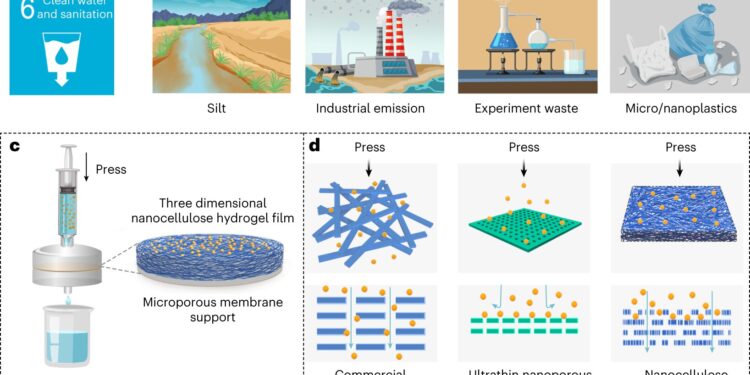Characteristics of BNHF in the filtration of water contaminated by SS. a, Schematic diagram showing the importance of clean water and sanitation in SDG 6. b, Schematic diagram showing the main sources of SS in contaminated water. c, Schematic demonstration of filtration and purification of SS-contaminated water using BNHF. d, Schematic diagram showing the advantages of using hydrogel film in BNHF to purify SS-contaminated water compared to commercial filter paper and ultrathin nanoporous membrane. Credit: Sustainability of nature (2024). DOI: 10.1038/s41893-023-01264-9
More than 2 billion people, or around a quarter of the world’s population, do not have access to drinking water. A new portable and affordable water filtration solution created by researchers at the University of Texas at Austin aims to change that.
The new system collects dirty water with a syringe and injects it into a hydrogel filter that removes almost all small particles. It also offers significant advantages in cost, simplicity, efficiency and sustainability over existing commercial options, giving users the ability to easily decontaminate water from nearby streams and rivers and make it drinkable.
“The urgent concern of particulate matter-polluted water, especially in remote and underdeveloped areas where people frequently rely on contaminated water sources for consumption, demands immediate attention and recognition,” Guihua said Yu, professor of materials science at Walker’s Cockrell School of Engineer. Department of Mechanical Engineering and Texas Materials Institute. “Our system, with its high efficiency in removing various types of particles, offers both an attractive and practical solution to improve the availability of fresh water.”
The research is published in Sustainability of nature.
Current options for portable water filtration of tiny particles consist primarily of filter paper and microporous membranes. According to research, these devices filter approximately 40% and 80% of particles larger than 10 nanometers, respectively. This new system captures almost 100% of these particles.
It is made from inexpensive, durable and readily available materials. The main innovation is an interwoven network of nanocellulose fibers that traps particles as newly cleaned water passes through. All the user has to do is take the syringe to the nearest water source, withdraw the water and inject it through the filter. The system takes care of the rest and produces clean, drinkable water.
The filtration system has been tested with several types of water sources, including muddy water, river water, and water contaminated with microplastics. Hydrogel films are biodegradable and can be used up to 30 times before needing to be replaced.
The research team tested the technology using syringes of up to 1.5 liters, or about 40% of an individual’s daily drinking water needs. They plan to continue developing the technology to use it on a larger scale to meet the world’s drinking water needs.
The researchers were motivated by one of the United Nations’ Sustainable Development Goals to improve standards of drinking water and sanitation around the world.
“The reality is that a significant percentage of the world’s population does not have access to clean water, even in places where fresh water sources are available,” said Chuxin Lei, lead author and graduate student working in Yu’s laboratory. “There is an urgent need for simple, universal and effective materials and devices for purifying water contaminated with particles, which should be able to help people around the world obtain clean water.”
Project team members also include collaborators from Northeast Forestry University, Shanghai Technological University and Tsinghua University.
More information:
Meihui Jiang et al, A biological nanofiber hydrogel filter for sustainable water purification, Sustainability of nature (2024). DOI: 10.1038/s41893-023-01264-9
Provided by the University of Texas at Austin
Quote: An injectable water filtration system could improve access to drinking water (January 22, 2024) retrieved January 22, 2024 from
This document is subject to copyright. Apart from fair use for private study or research purposes, no part may be reproduced without written permission. The content is provided for information only.



